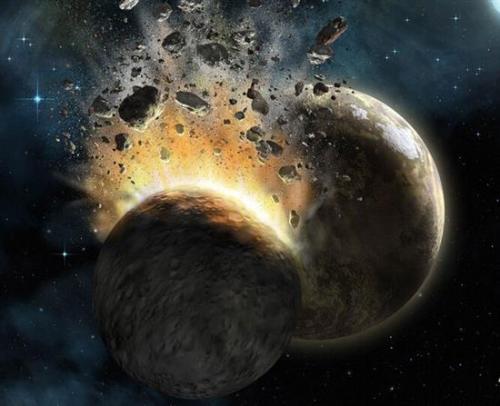(单词翻译:单击)
As one commentator has put it, fleeing would mean "selecting a slow death over a quick one. The death toll would be very little affected by any plausible relocation effort, since Earth's ability to support life would be universally diminished."
有一位评论家说,逃跑意味着“在慢死和快死之中选择慢死。无论你怎么改变位置,死亡的人数不会受到多大影响,因为地球支持生命的能力将会普遍降低”。
The amount of soot and floating ash from the impact and following fires would blot out the sun, certainly for months, possibly for years, disrupting growing cycles. In 2001 researchers at the California Institute of Technology analyzed helium isotopes from sediments left from the later KT impact and concluded that it affected Earth's climate for about ten thousand years.
撞击产生的浓烟和飞灰以及随之发生的大火,肯定会遮天蔽日达数月之久,有可能是数年之久,打乱了生长周期。2001年,加州理工学院的研究人员分析一次KT撞击留下的沉积物里的铱同位素后,得出结论说,它对地球气候的影响达1万年左右。
This was actually used as evidence to support the notion that the extinction of dinosaurs was swift and emphatic—and so it was in geological terms. We can only guess how well, or whether, humanity would cope with such an event.
这完全可被用做证据,证明恐龙的灭绝是快速的,彻底的——从地质学看来,情况就是如此。人类在多大程度上或是否能够应付这样的事件,我们只能猜猜罢了。
And in all likelihood, remember, this would come without warning, out of a clear sky.
记住,这样的事件很可能像是晴天霹雳,令人猝不及防。
But let's assume we did see the object coming. What would we do? Everyone assumes we would send up a nuclear warhead and blast it to smithereens. The idea has some problems, however. First, as John S. Lewis notes, our missiles are not designed for space work. They haven't the oomph to escape Earth's gravity and, even if they did, there are no mechanisms to guide them across tens of millions of miles of space.
不过,我们来假设一下,我们看到了那个物体在飞过来。我们会怎么办?人人都认为,我们可以发射一枚核弹头,把它炸成碎片。然而,那种办法有几个问题。首先,正如约翰·S·刘易斯所说,我们的导弹不适于在宇宙里作业。它们没有本事摆脱地球的引力;即使摆脱了地球的引力,我们也没有这个装置来操纵它们,让它们在太空里飞行数千万公里。


